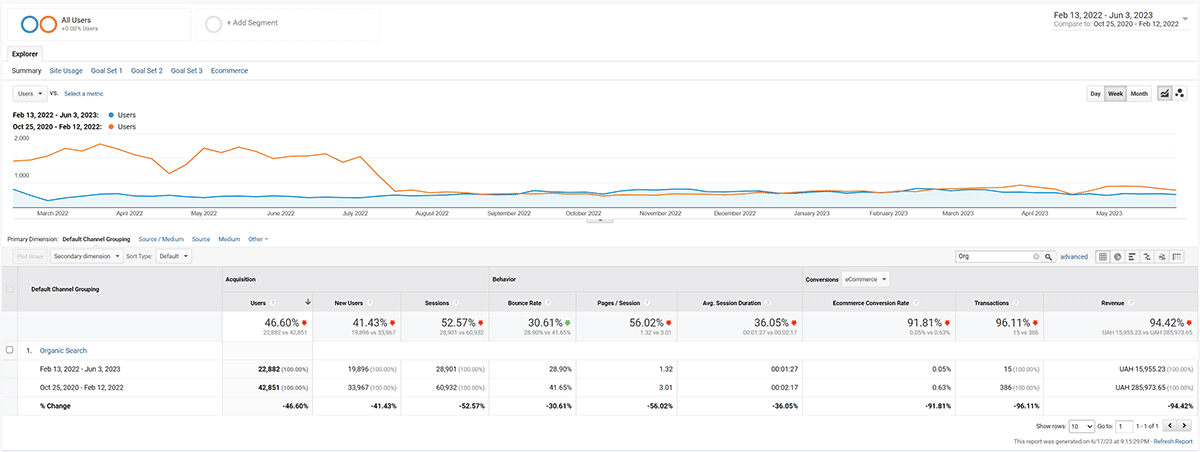Service
SEO and promotion of a large e-commerce website specializing in the sale of auto parts and car maintenance products.
Objective
The overarching goal of this SEO promotion project is to increase the website's traffic and attract a larger pool of potential clients.
Specific Task – to evaluate the prospects of restoring the site's previous rankings after an ill-prepared migration to a new CMS.
Website Before Our Intervention
Previously, the site was hosted on the Prom.ua platform and then “migrated” to Horoshop. The client decided to change the CMS without consulting specialists. They approached us for assistance a year later, by which time:
- Organic traffic had plummeted by 44%.
- Profit from the website had nosedived by 95%.

Why Did This Happen? During the migration of a website to a new CMS, one of the primary tasks is configuring 301 redirects from old pages to new ones. This needs to be done for each page on the site. Spoiler alert: the client did not set up redirects.
A 301 redirect is a type of permanent redirect that informs search engines that a page has been moved to a new URL. This is crucial for preserving old rankings in search results and preventing traffic loss. Additionally, through a 301 redirect, the link equity of the old page is “redirected,” which positively affects SEO.
Project Activities
Work on the project commenced with a thorough analysis of the website and gathering information from the client. We studied its structure and content, determining the baseline visibility and positions of the site.
We observed a decline on all fronts.
The decision was made to treat the website as a new project. Such an approach is justified when rectifying migration errors would require more effort and resources than starting fresh. However, it was crucial to consider one aspect: there could still be active backlinks from other sources leading to non-existent pages (since all the site's URLs had changed). To prevent site visitors and search engines from encountering a 404 error (“page not found”), an SEO specialist compiled all old-format URLs and set up 301 redirects to new existing pages. This helped recover some link equity to our site.
Current Status of the Site
Regrettably, the website has not yet returned to its “pre” performance levels. Work is ongoing.
Migrating a website to a new CMS is a complex process that demands meticulous planning and proper execution. In this case, errors made during the migration led to significant SEO issues that have yet to be fully resolved.
Conclusions
Analyzing the website migration process yields the following conclusions:
- Migrating a website to a new CMS is a complex and responsible task that requires special attention to detail and careful actions.
- Errors during migration can result in significant drops in a site's rankings and traffic.
- Proper configuration of 301 redirects is a crucial step during migration. The quality of this work directly impacts the preservation of link equity and site positions in search engines.
- When problems arise after migration, swift action, and solutions are necessary. In this case, the decision to treat the website as a new project was made to regain control of the situation.
- The necessity of migration should always be evaluated in terms of risks and potential benefits. It might be worth considering alternative site development options unrelated to migrating to a new CMS.
Ultimately, website migration is not merely a technical procedure but a complex process that demands a well-informed approach and profound knowledge in the realms of SEO and web development.
